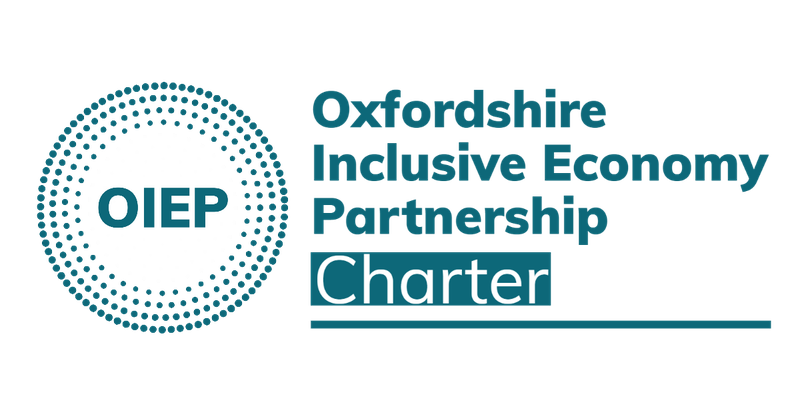Equality, Diversity and Inclusion
Equality, diversity and inclusion are not just aspirations. We strive to ensure that our equality work is central to all policy development, decisions and practice. The Equality, Diversity and Inclusion Committee of the College leads a proactive approach to eliminating discrimination, advancing equal opportunities and fostering good relations in the College. The Governing Body appoints a Fellow for Equality, Diversity and Inclusion who oversees the implementation of matters relating to equality. We also have a committed and innovative Access and Outreach team, who aim to encourage promising pupils to aim high, regardless of background.
The College’s strategy for equality, diversity and inclusion is guided by four overarching themes:
- Embedding culture, values, diversity, dignity and well-being in all of our functions and services to ensure that everyone has a role to play in improving our College culture.
- Ensuring fair processes and transparency in the way we do things to show people that they belong in St John’s and are valued.
- Empowering staff and students so that they can work and study to the best of their abilities
- Communicating through fostering dialogue, modelling good practice and developing an engagement strategy to drive equality, diversity and inclusion forward.
We want everyone to feel at home at St John’s. By working in partnership and solidarity with everyone in College, we will continue to learn, to better ourselves, and to make a difference to wider society.
This Magical Gallery
That opening moment at St. John’s,
When you as new students or staff cross the border of the porters’ lodge,
You all take lifelong ownership of a new home.
Regardless of your hardships, colour, culture or faith
This is a place where the table of your future can be laid.
This college is just as much for Ukachi and Ali as it is for Jones and Smith;
Whether your name is Anderson or Mohandas,
These walls and lawns are for you.
It is just as much your right, when woken for lectures before dawn,
To yawn over breakfast in its halls.
So as you arrive,
With the happy rattle of your suitcase wheels
as they glide up St. Giles for the first time,
You can imagine that, one day,
You may gaze out at us from one of these glorious portraits;
In the meantime, you will always belong in our crowd,
Your face, a proud part of this magical gallery.
- Musa Okwonga (1998, Jurisprudence)
College anti-racism statement
St John’s is committed to becoming an anti-racist community. Racism exists within our own community as well as in society at large. It is unacceptable that any College member or visitor experiences racism and we pledge to acknowledge, challenge and dismantle structural racism within our policies, practices and behaviour. We are determined to ensure that St John’s College provides a supportive and inclusive environment in which all our students, staff and Fellows can flourish.
- President and Governing Body, July 2021
Race and Equality Working Group report and action plan
During 2020-21 the College set up a working group on race and equality to address the concerns of the BAME community and identify priorities for action. Members of the group included College students, staff and Fellows and we also benefited from advice from a group of alumni. The working group’s final report is here.
As a result of the Working Group’s findings, the College has an agreed action plan. Some of the short-term steps we have agreed to implement include:
- Implement a system of active support in order to improve the experience of BAME students in College.
- Embed diversity and anti-racism training for all students into College life beyond Freshers’ week.
- Establish a mentoring scheme for BAME students, drawing on the experience of interested alumni.
- Work with outside providers to develop diversity and anti-racism training for all staff and Fellows that is tailored to the College context and culture.
- Explore ways of increasing staff diversity, including working with suitably experienced local employers and running an open day for the local community
- Incorporate the celebration of diversity into the life of College, starting with a photographic exhibition to celebrate current and former BAME members.
- Participate in the University’s Black Academic Futures programme and explore future funding possibilities to support access for under-represented groups
We recognise that these are only the first steps in what must be an ongoing effort to improve the lived experience of BAME members across the College, and we will continue to work towards sustained change.
Colonial Past Project
St John’s and the Colonial Past is an innovative project founded in 2019 which explores connections between the College and colonialism, uncovering benefactions to St John's and the alumni who served in the empire. The project has produced a range of podcasts, blog posts, online exhibitions and more, with the aim of sharing its findings as widely as possible. You can learn more about the project on its webpage here.
Celebrating Diversity portrait exhibition
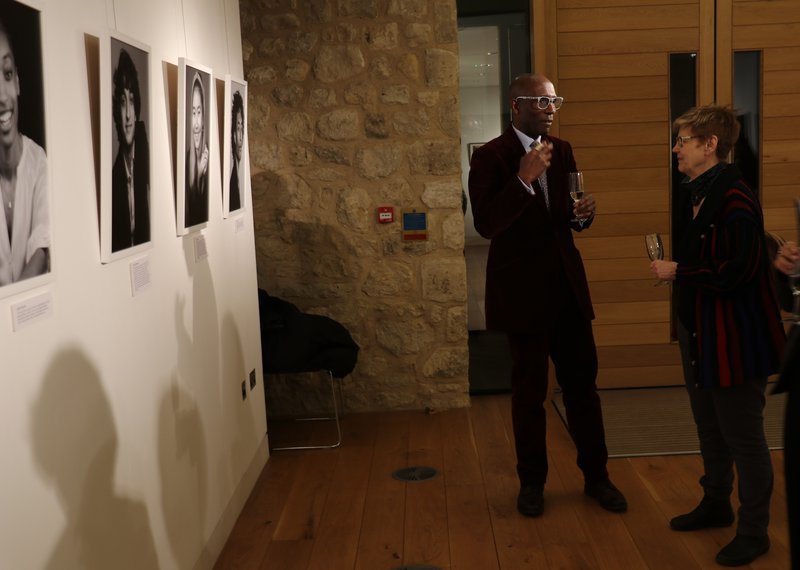
In 2021, following the recommendations of the BAME Working Group, the College commissioned a collection of portraits to celebrate diversity at St John’s by photographer Robert Taylor. These portraits feature BAME members of our student, Fellow, alumni and non-academic staff communities, accompanied by a written piece on their experience of life and St John’s.
The exhibition ran in-person in our Barn Gallery in 2022. We are delighted to be able to offer an online version of the exhibition for those who were not able to see it in-person. To visit the online exhibition, click here.
St John’s admitted its first female students in 1979, and since then we’ve come a long way in the representation and celebration of women* in all aspects of St John’s life. We take every opportunity to celebrate, inspire and sustain women and their contribution to College, and are proud to have launched the careers of many women now making valuable contributions across a variety of industries.
40 Years of Women
2019 was the 40th anniversary of the first female students coming to College. We hosted a wide range of events to mark this special milestone, including panel discussions, an online exhibition, and a (slightly Covid-delayed!) celebration in College. ‘Reflections of a President after 40 Years of Women’ brought together many alumna, Fellows and staff for a day of celebration and discussion around a range of topics, from life transitions and defining success to diversity and inclusion.
You can access many of the resources created for 40 Years of Women, including webinars of the panel discussions, on the website here.
SJC Women’s Network
We’re lucky here at St John’s to have the SJC Women’s Network, which brings together women* from all areas of College and all over the world to facilitate broad connections. The Women’s Network is managed by a Steering Committee made up of alumni and students who kindly volunteer their time to run the Network. They hosts speaker events, organises networking and mentoring opportunities and hosts the Women’s Leadership Programme for graduate students.
Click here to find out more about the Women’s Network.
*At St John’s we use an inclusive definition of ‘women’ to include anyone who identifies partially or wholly as a woman, transfeminine or has any feminine aspect to their identity.
St John’s is committed to being an open and inclusive community where everyone has access to the support they need to succeed. We welcome students with any kind of visible or invisible disabilities, including long-term mental health conditions and Specific Learning Differences, and work closely with them to ensure they can participate in college life as fully as possible. St John’s fully supports the guiding principles underpinning procedures for supporting disabled students which are set out in the University’s Disability Common Framework statement at https://academic.admin.ox.ac.uk/common-framework-for-supporting-disabled-students
Disability support at Oxford (Information and lifecycle map)
Building accessibility
St John’s is very proud that many of our buildings are accessible to those with physical disabilities. The University’s Access Guide to St John’s, which you can visit by clicking on this link, gives detailed information on building accessibility for visitors and members of College. The main entrance is via the Porters’ Lodge on St Giles and is fully accessible to wheelchair users. The porters are always happy to provide help if needed 01865 277300.
Staff support available
Elaine Eastgate (Senior Academic Officer) is our College Disability Co-ordinator and the first point of contact for students with disabilities. Elaine is able to support students who would like to apply for exam adjustments, such as extra time, and assist with any other issues related to disability. The Fellow for Equality, Diversity and Inclusion is the College Disability Lead for policy matters.
Accommodation
We have a number of rooms on-site in College which have been adapted to suit the needs of students with physical disabilities. Adaptations include rooms with ensuite facilities, adapted kitchens, and a kitchen adapted for wheelchair users and blind and partially-sighted students. We also have a suite of rooms in our Beehive building including an adjoining carer’s room.
If you are coming to St John’s and have any specific concerns, please contact our College Disability Co-ordinator who will be happy to assist.
Funds for disabled students
The Higby Will Trust Study Support Grant helps students with declared disabilities to pursue their academic work by making a contribution towards costs of an academic nature incurred as a direct result of their disability and which are not provided for either within the Disabled Students’ Allowance (DSA) or by other means. For further information, please contact the College Disability Co-ordinator.
University support
The University Disability Advisory Service (DAS) is also on-hand to provide information and advice on disability issues and facilitates support for those with, for example, sensory or mobility impairments, long-term health conditions, specific learning difficulties, autistic spectrum conditions or mental health difficulties. Students are encouraged to tell the DAS about any disabilities as early as possible, ideally before starting their course, so they can benefit more quickly from the support available. You can find more information about what the DAS offers by clicking on this link.
St John’s College is committed to recruiting the best students regardless of background. It is through seeking out academic potential from the widest range of groups and settings that we realise our commitment to excellence. Our Access and Outreach Officers, tutors and student ambassadors work with schools and colleges to encourage and support students considering applying to Oxford.
Through the St John's Inspire Programme we want to encourage pupils with exceptional promise to aim high, to stretch themselves academically and to be confident in making applications to top universities like Oxford. The Inspire Programme offers a series of programmes, events, and opportunities to pupils from non-selective state schools in the college’s link regions (Brighton & Hove, Ealing, East Sussex, Harrow, Southampton, West Sussex), as well as areas in the Oxford for South East group (Hampshire, Isle of Wight, Kent, Medway, Portsmouth, Surrey).
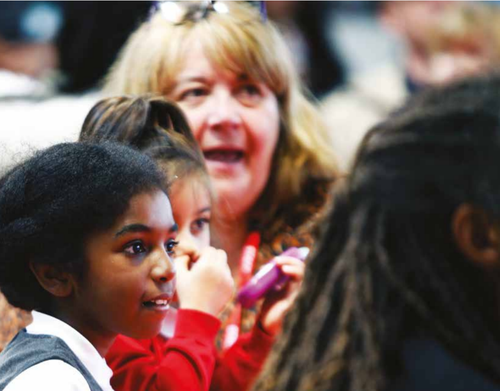
With the launch of the new Inspire Primary initiative, the Inspire Programme now engages with 1,872 pupils aged between 5 and 18, ensuring that we encourage pupils’ intellectual curiosity throughout their school years. In 2022, the Pre-GCSE Inspire Programme will be expanded to include a further 2,250 pupils, and we predict that the around 4,000 pupils will be engaged in our programmes in the 2022/23 academic year. The Pre-GCSE Inspire Programme (Inspire 9, 10 & 11) and the Post-GCSE Inspire Programme (Inspire 12 & 13) are sustained contact schemes which foster pupils’ engagement with higher education throughout their secondary and sixth-form education, and provide a consistent point of contact with the college.
Over the last year, the digital resources available on the Inspire Digital have been expanded. The Careers Inspiration Hub now includes a collection of videos interviewing various professionals, and highlights their individual education and career paths. We have also formulated a ‘DIY Virtual Visit’ page where pupils, teachers and guardians who cannot attend an in-person visit to the college can still access virtual tours of Oxford, the Oxford Explained talk, and advice on the application process and admissions tests. Subtitling will be added to videos on the Inspire website going forward to allow those who cannot access the auditory component of media to fully engage with its content, and our website has been checked for its accessibility.
The Inspire Programme offers two awards to support students taking part the in opportunities offered by St Johns. The Inspire Travel Award works to relieve some of financial burden placed on pupils travelling to events at St John’s. The Travel Award works on a sliding scale of renumeration, so pupils travelling from further afield are not disproportionally impacted by the costs of travel. The Digital Assistance Awards were introduced during the Covid-19 pandemic, when many events and programmes moved online. The award enables students to work with digital equipment (such as headphone sets, tablets, and mobile hotspots) which are vital for their educational engagement, and which they would not otherwise have access to.
You can find out more about our Access and Outreach programmes on the website by clicking here.
Here at St John’s we know that our diversity is what makes us great. We are proud to be a community with members coming from a range of backgrounds, and from all around the world, and we take every opportunity to celebrate this.
In addition to the regular dinners below, we also host events to celebrate a variety of cultural events, such as Diwali and Chinese New Year, and talks by prominent figures on relevant occasions, such as during Black History Month. These events can usually be found on our Events Page if open to members of the public, or on our Intranet and newsletters if for members of College.
BME Dinner
Our annual BME dinners allow BME members of the JCR, MCR and SCR to gather for drinks, dinner and an inspirational talk from a special guest lecturer. Read more about our most recent dinner here.
Women's Dinner
The annual Women's Dinner is organised by the JCR and MCR Women's Officers and is open to all women in College from across the staff and student communities.
International Dinner
Our International Dinners have taken place termly since 2017, and give international students the chance to come together as a community to enjoy delicious food in Hall. Each dinner has a different theme, with the menu chosen by a student from the chosen country.
So far we’ve sampled cuisine from Vietnam, Mexico, Venezuela, Brazil and more.
LGBTQ+ Dinner
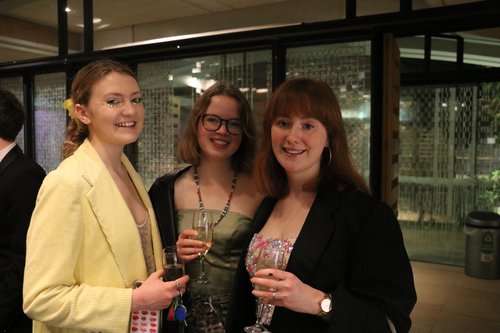
We have been delighted to host LGBTQ+ Dinners during February, to coincide with LGBTQ+ History Month. In the past we have also hosted drinks for members of the College LGBTQ+ community, and a talk to celebrate LGBTQ+ History Month.
International Graduate Lecture Supper
These lecture suppers run every term, and hit their ten year anniversary in 2017. In this series a graduate student delivers a lecture about their country to an audience of students and senior members, followed by supper. These events have proved incredibly popular with the St John’s community, with speakers from over 30 countries featured.
Our JCR and MCR appoint several positions to support students across the undergraduate and graduate communities, including Equality and Diversity Officer, Women’s Officer and representatives for BAME students, LGBTQ+ students, and students with disabilities. They work closely with Fellows and staff from College and the central University to represent students on college committees and improve the lived experience of students of various identities at St John’s.
To find out more about student-led support and find contact details of the current committees, visit the JCR website here and the MCR website here.
Total students on course
Data are from the Student Statistics Snapshot for December of each year. Equivalent University percentages are written in brackets underneath for comparison. A Word document containing the full table can be viewed by clicking here.
Gender
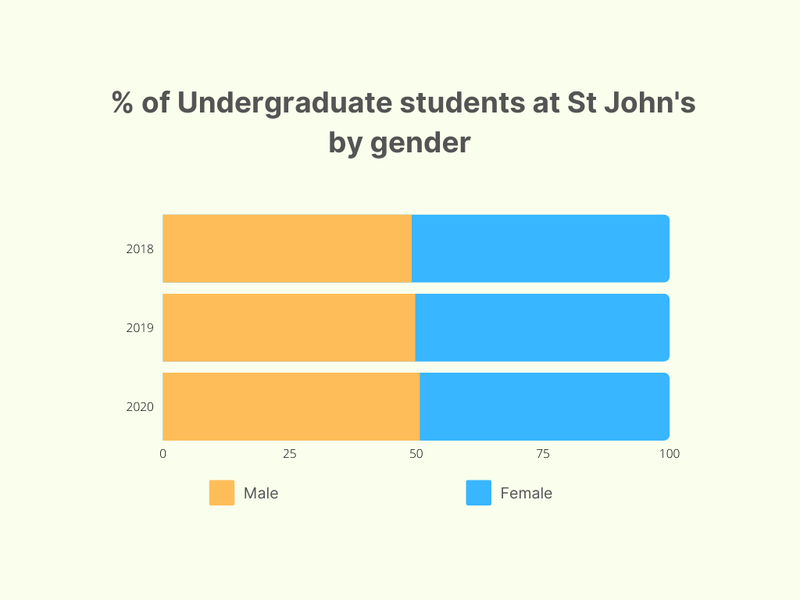
(University levels: 2018 M 51.4%, F 48.6%; 2019 M 50.2%, F 49.8%; 2020 M 48.9%, F 51.1%).
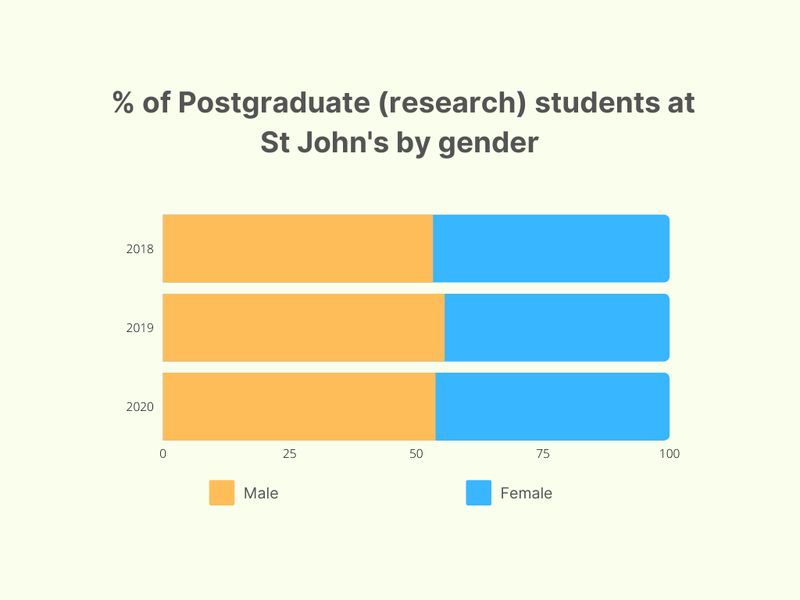
(University levels: 2018 M 58.1%, F 41.9%; 2019 M 57.7%, F 42.3%; 2020 M 56.9%, F 43.1%).
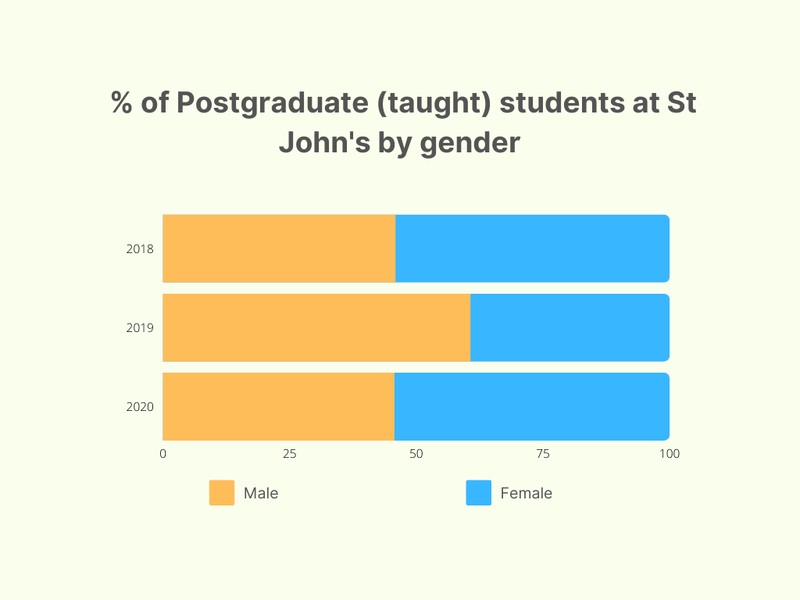
(University levels: 2018 M 53.3%, F 46.7%; 2019 M 51.5%, F 48.5%; 2020 M 50.4%, F 49.6%).
Ethnicity
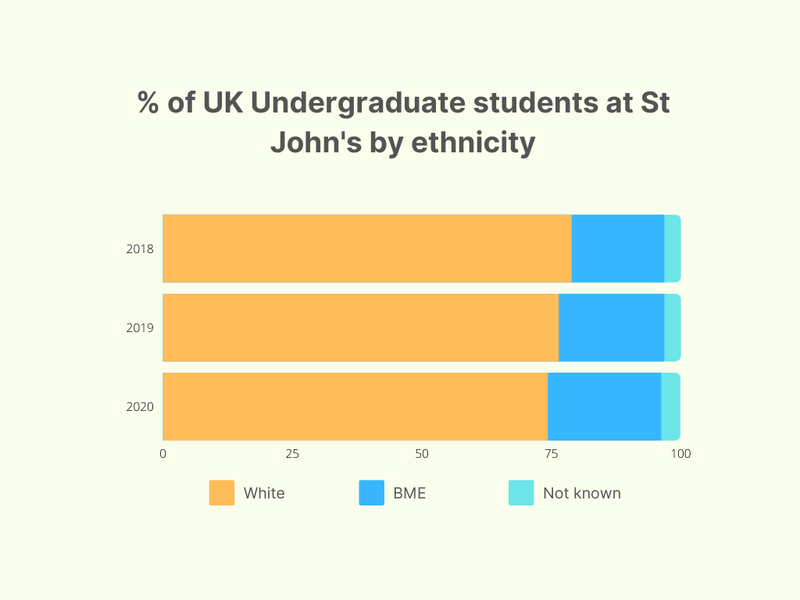
(University levels: 2018 White 80.6%, BME 17.4%, Not known 5.4%; 2019 White 45.7%, BME 48.4%, Not known 5.9%; 2020 White 45.7%, BME 48.2%, Not known 6.1%)
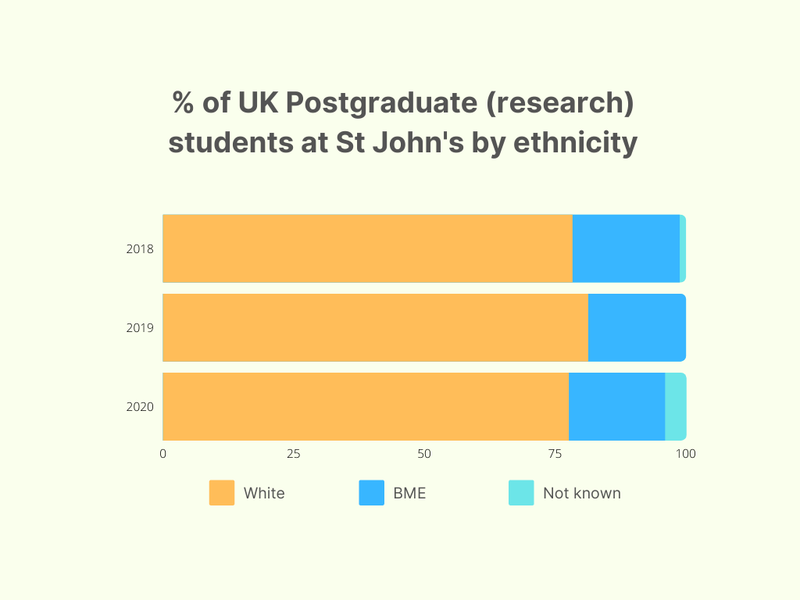
(University levels: 2018 White 79.5%, BME 16.8%, Not known 3.7%; 2019 White 79.2%, BME 16.4%, Not known 4.4%; 2020 White 77.4%, BME 17.4%, Not known 5.2%)
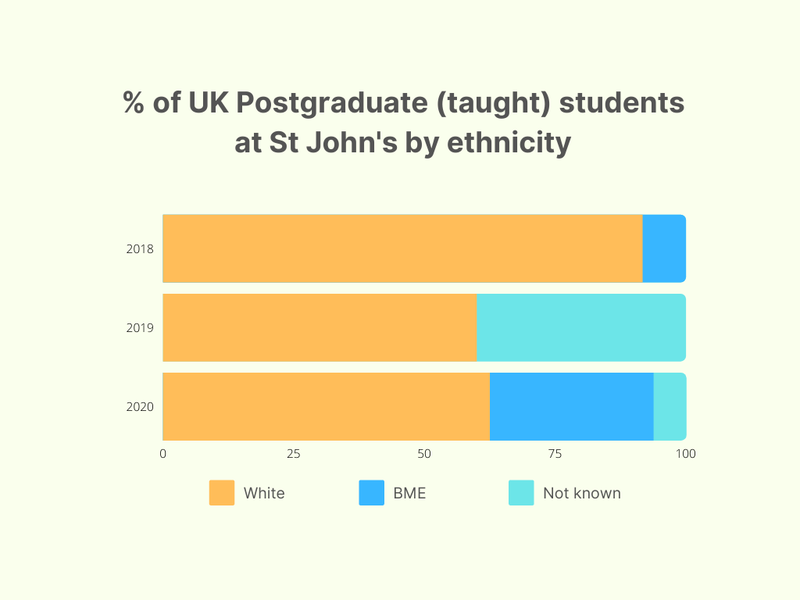
(University levels: 2018 White 73.1%, BME 23.0%, Not known 3.9%; 2019 White 71.2%, BME 24.7%, Not known 4.1%; 2020 White 69.8%, BME 25.7%, Not known 4.5%)
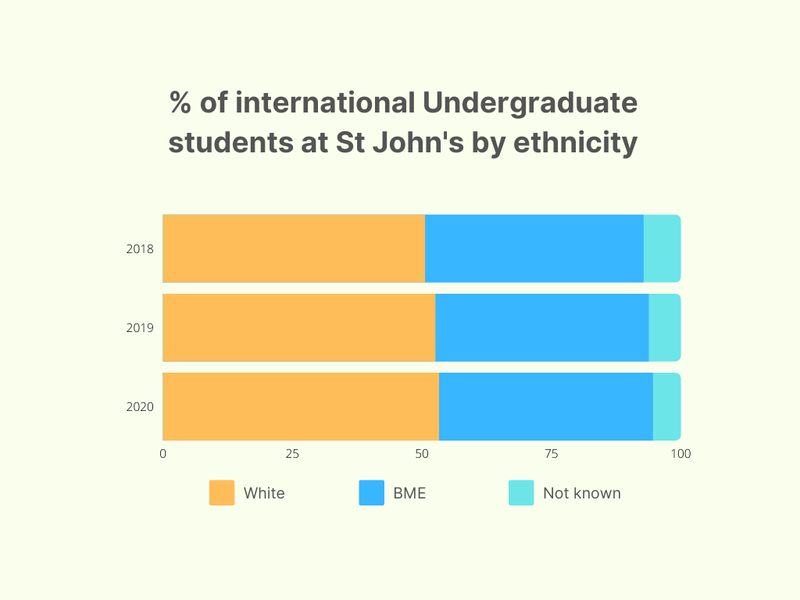
(University levels: 2018 White 47.4%, BME 47.1%, Not known 5.4%; 2019 White 45.7%, BME 48.4%, Not known 5.9%; 2020 White 45.7%, BME 48.2%, Not known 6.1%)
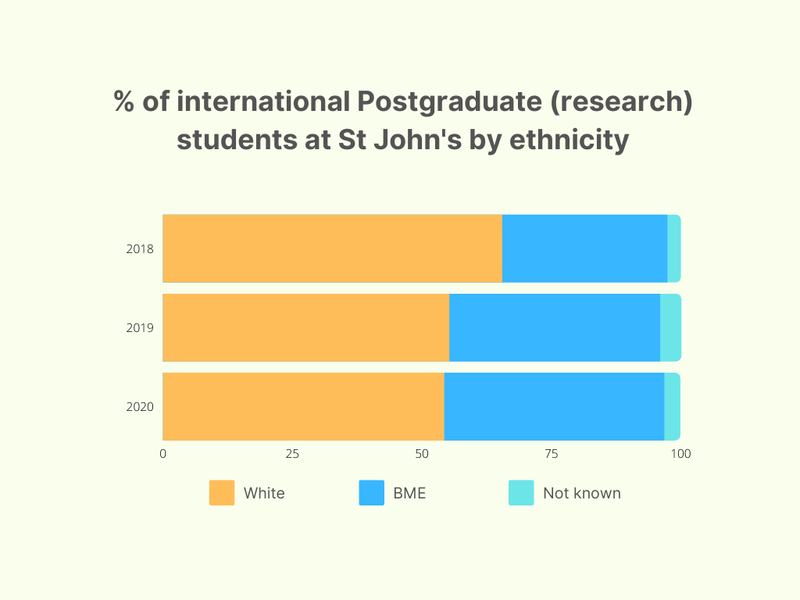
(University levels: 2018 White 52.2%, BME 43.5%, Not known 4.3%; 2019 White 48.4%, BME 46.2%, Not known 5.4%; 2020 White 46.1%, BME 48.1%, Not known 5.8%)
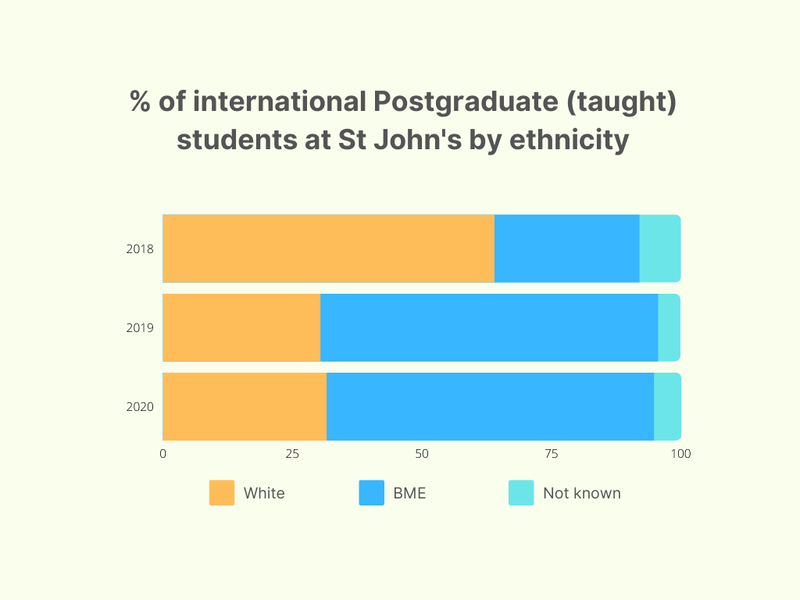
(University levels: 2018 White 49.5%, BME 46.5%, Not known 4%; 2019 White 48.4%, BME 47.6%, Not known 4%; 2020 White 45.6%, BME 50.3%, Not known 4.1%)
To access our Equality Policy, Harassment Policy or Public Sector Equality Duty Policy please visit the Policies page. To access our Public Sector Equality Duty Report please visit the College Reports and Statements page.
St John’s College has signed the Oxford Inclusive Partnership Charter to support a more inclusive County.
The Charter was created by the Oxfordshire Inclusive Economy Partnership, a group of over 100 organisations working together to share knowledge, expertise and resources to make Oxfordshire a fairer and more inclusive place to live and work. St John’s is an accredited Oxford Living Wage employer and is committed to building a more diverse and inclusive workforce. We promote an inclusive learning and working environment in which all are welcome.
